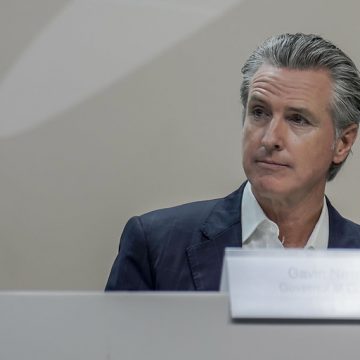Decarbonisation is emerging as a key business differentiator. Accenture’s latest report on the decarbonisation activities of the world’s largest companies finds that those that connect climate ambition to business strategy are cutting emissions faster and creating lasting value. But the journey is far from complete: just 16% are on track to reach net zero in their operations by 2050.
Author: admin
Governor Newsom: subnational climate action is a defining opportunity
Governor Newsom said California is leading by example, proving that climate action and economic growth go hand in hand. As California continues and accelerates its climate action, the Governor urged global investors to embrace the technologies and infrastructure driving the clean energy future.
The surprising psychology of dietary choices
Food systems are a major contributor to environmental impacts, such as greenhouse gas emissions and biodiversity loss, with widespread dietary changes required to avoid surpassing safe planetary boundaries by 2050. A study published in Elsevier’s Journal of Cleaner Production analyses the dimensions underlying public perceptions and misperceptions of food's environmental impact.
New framework to measure, manage and communicate circularity
The Global Circularity Protocol for Business (GCP) has been launched to accelerate the transition to a circular economy by providing a global framework for measuring, managing and communicating an organisation’s circular performance and its impacts. Developed by the World Business Council for Sustainable Development (WBCSD) in collaboration with the UNEP-hosted One Planet Network (OPN), the GCP enables organisations to embed circularity at the heart of strategy and operations.
Stiell: we are in a new era of climate action and ambition
UN Climate Change Executive Secretary Simon Stiell, on the launch of the Nationally Determined Contributions Synthesis Report, released on 28 October 2025, said that we are in a new era of climate action and ambition. Countries are setting national climate targets – and plans to achieve them – that differ in pace and scale to any that have come before.
Consultations launched on GHG Protocol accounting
Greenhouse Gas Protocol (GHG Protocol) has launched a 60-day period for two public consultations. One consultation focuses on updates to the Scope 2 Guidance (2015) which addresses inventory accounting, while the other seeks feedback on consequential accounting methods for estimating avoided emissions from electricity-sector actions. These are the first public consultations in a broader effort to update GHG Protocol’s suite of corporate standards and guidance.
Progress towards the Paris Agreement goals is alarmingly inadequate
Although more than three-quarters of indicators are heading in the right direction, progress towards the Paris Agreement temperature goal is alarmingly inadequate, exposing communities, economies and ecosystems to unacceptable risks. The State of Climate Action 2025 report says that global efforts across 29 indicators are well off track, such that at least a twofold (and for most, more than a fourfold) acceleration will be required this decade to keep the 1.5°C limit within reach.
Jobs of tomorrow: technology and the future of jobs
The World Economic Forum’s Jobs of Tomorrow: Technology and the Future of the World’s Largest Workforces explores how AI, robotics, energy and network technologies are reshaping seven major job families that together employ 80% of the world’s workers: agriculture, manufacturing, construction, retail and wholesale trade, transport and logistics, business and management, and healthcare.
10 innovations for climate action and planetary health
A new report spotlights 10 tech solutions to accelerate climate action – from carbon-locking concrete and sustainable desalination for arid regions to cars that feed the electric grid. The research maps a wave of emerging technologies with significant potential to tackle climate disruption head-on, from droughts to methane leaks to rising seas. The report focuses on food, water, energy and materials – key systems for a stable planet – showing how science can safeguard planetary health and curb destructive human activity.
EU Climate Diplomacy: strengthening carbon pricing and markets
Carbon pricing is gaining ground worldwide as a cost-effective way to cut greenhouse gas emissions and drive clean growth. Building on 20 years of experience with the EU Emissions Trading System, the European Commission’s Task Force on International Carbon Pricing and Markets Diplomacy works with 25+ partner countries to advance high-integrity carbon pricing and markets policies.
UK clean energy boom to bring thousands of new jobs
The UK Government has published a comprehensive national plan to train up the next generation of clean energy workers, with employment expected to double to 860,000 by 2030, ensuring jobs are high quality and well paid. Setting clear workforce estimates for the first time will galvanise industry, the public sector, and education providers to work together to deliver one cohesive strategy to invest in training for specific in demand occupations.
Warming is making extreme wildfires more likely and more severe
New analyses of the 2024-25 fire season add to the growing evidence base that warming is making extreme wildfires more likely and more severe. Some of the most prominent extreme wildfire events of the global fire season, in Los Angeles and parts of South America, were 2-3 times more likely due to climate change, and the area burned by wildfires during those events was 25-35 times larger.
Households in Dutch Zeeland act to lower peak demand
A thousand households on the Dutch municipalities of Walcheren, Schouwen-Duiveland and Tholen are load-shifting, successfully changing their electricity consumption to times with plenty of solar power. In a joint trial set up by grid operator Stedin and energy companies DELTA Energie and Eneco, participants were asked to make minor changes in their behaviour.
Salt water fuel signals shift to clean shipping
Scientists have secured more than £1m in funding to turn seawater into fuel to power ships, ferries and fishing boats. Researchers at Brunel University of London and Genuine H2 will split seawater into hydrogen, store it safely on-board ships and boats and burn it to power engines emitting only steam.
Threatened species and precious habitats to be better protected
New funding for local projects across 12 UK Overseas Territories and 36 developing countries will be rolled out over the next five years, according to the UK Government. The package will support local action to restore nature, reduce poverty and address climate change around the world. This will help protect 1.5m hectares of forest in Bolivia, recover St Helena’s cloud forest and support critically endangered eagles in the Philippines.




